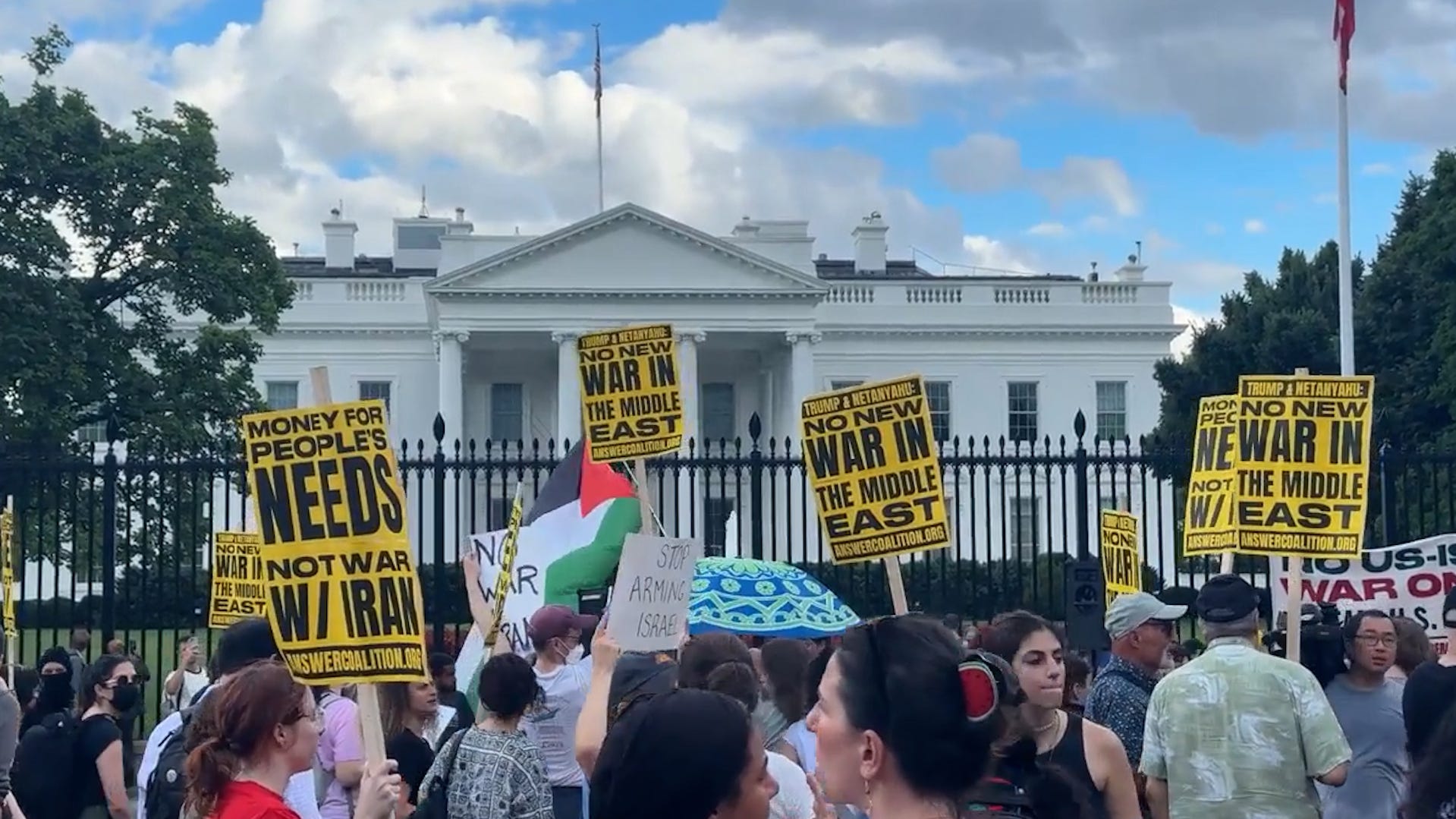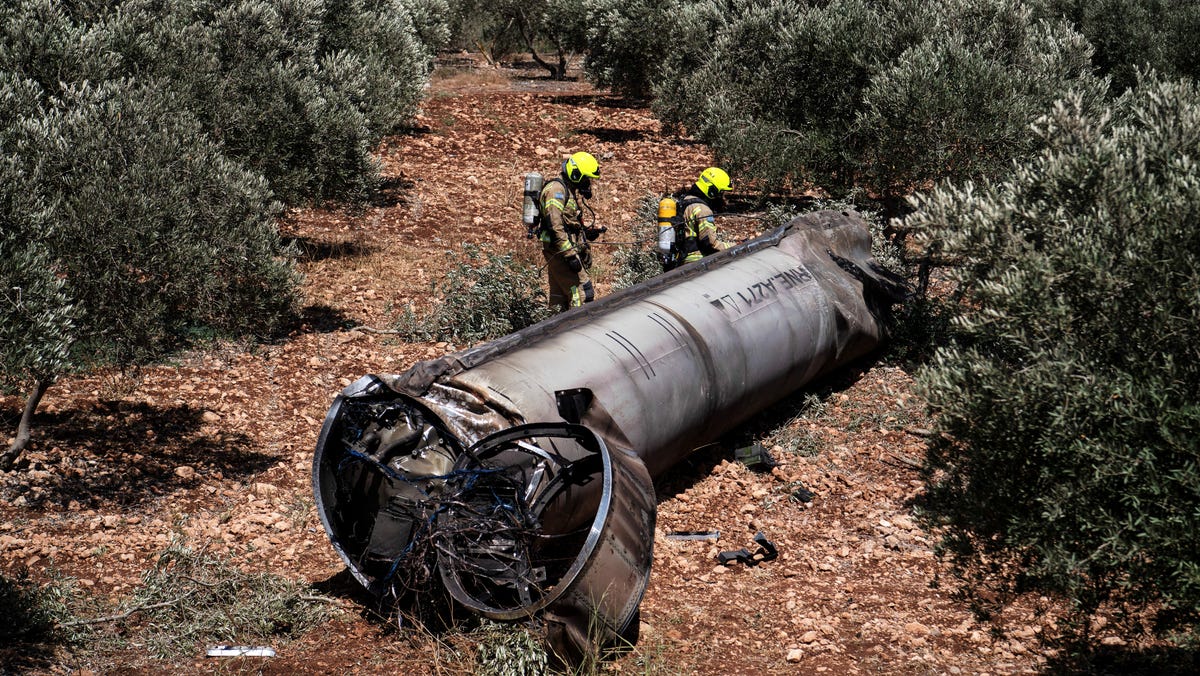Dialogue alone won’t solve the problem. But it’s where every solution begins. It also allows us to talk about the hopeful side of nuclear science. So I’m proposing something unconventional.

Anti-war protests arise as world awaits Trump’s Iran decision
Demonstrations have popped up across the country to protest Israeli military actions in the Middle East.
A ceasefire in the war between Iran and Israel presents an opportunity for global peace.Cooperation is essential for nuclear safety, and the Non-Proliferation Treaty and International Atomic Energy Agency are crucial for preventing proliferation.The greatest nuclear threat is a potential exchange between superpowers, which could be triggered accidentally.Dialogue, such as the proposed “Oppenheimer Dinner,” is necessary to initiate solutions and discuss the positive aspects of nuclear energy.
The war in Iran has been terrifying. It pushed the threat of nuclear weapons back to the forefront of global consciousness. And yet – somehow – we’ve made it through this conflict in better shape than many feared, assuming the ceasefire holds.
We now have an unexpected opportunity to turn this narrow escape into something bigger: a chance to expand global peace and security.
Like many, I have serious criticisms of how we got here. A nation that has never signed the Non-Proliferation of Nuclear Weapons Treaty, Israel, used its undeclared nuclear status as leverage to launch a war against a country, Iran, that has no nuclear weapons and has submitted to international inspections. This directly sabotaged promising diplomatic efforts between Iran and America. When the United States entered the conflict with a military strike June 21, Americans braced for another endless war in the Middle East.
And yet, remarkably, we’ve arrived at a ceasefire. That outcome wasn’t inevitable. It required restraint from Tehran and surprising restraint from Washington. Credit must be given where it’s due: President Donald Trump played a central role in stopping the escalation, using his signature unconventional diplomacy. That success offers a model ‒ if we’re willing to learn from it.
Lesson 1: Stop the proliferation of nuclear weapons fuel
Since the first atomic breakthrough, one truth has remained: Safety in the nuclear age requires cooperation ‒ even with adversaries.
Nuclear science is not a secret that can be kept, it’s a fact of nature.
From J. Robert Oppenheimer onward, scientists knew the only real safeguard was shared control of enriched uranium that can be used for bombs. We need more cooperation to prevent nuclear proliferation ‒ not just in Iran, but everywhere.
Lesson 2: Strengthen the institutions that have kept us alive
The Non-Proliferation Treaty (NPT) is more than a piece of paper. It is the backbone of the global nuclear order. It has slowed the spread of weapons, legitimized peaceful nuclear energy and built mechanisms for trust.
The International Atomic Energy Agency ‒ through science and diplomacy, not force ‒ upholds this system.
We must double down on supporting countries that respect these rules and hold accountable those, like Israel and North Korea, that operate outside them.
The real nuclear threat before us
The dangerous gamble to start a war in order to stop a single weapon from being developed must not become the global standard. Because the far greater danger isn’t Iran or any one rogue nation ‒ it’s a nuclear exchange between superpowers.
That remains the true and growing risk, and it could even happen by accident. A false alarm, a cyberattack or a miscommunication could trigger an unstoppable chain reaction.
Once missiles fly among the United States, Russia and China, no leader or even unconventional diplomacy can stop it. There won’t be time.
So what can we do?
We build on what has worked. Trump’s success in brokering a ceasefire should now be expanded ‒ first to end the Gaza conflict, and then to revive stalled denuclearization dialogue.
Trump has previously called for nuclear talks among America, China and Russia. That is exactly the right idea ‒ and this could be the moment.
Some will call that impossible. They’ll point to rising tensions, trade wars, proxy conflicts. They’ll say the moment isn’t right. But history teaches the opposite: It is precisely in moments of danger that real diplomacy must begin.
Waiting for peace before negotiating peace is a contradiction. This is a time for bold action – of the Nobel Peace Prize variety – if done right.
We are still living under a nuclear arms strategy called mutual assured destruction. Even its acronym ‒ MAD ‒ tells us how unsustainable it is. The threat is too vast, too fast and too complex for any one nation or leader to control.
Most of us, as individuals, feel powerless in the face of such a system. But we’re not without agency. Some people do have real influence, and that includes the leaders of the United States, China and Russia. They cannot be expected to make unilateral concessions, but they can be expected to sit down and talk.
I’m not president. But I’m doing what I can ‒ using the name and ideas of my grandfather J. Robert Oppenheimer to push for a safer future.
So I’m proposing something unconventional: an “Oppenheimer Dinner,” inviting representatives from Washington, Beijing and Moscow to a private, off-the-record dialogue about how to reduce the risk of real nuclear war ‒ and discuss the positive side of nuclear energy.
Dialogue alone won’t solve the problem. But it’s where every solution begins. It also allows us to talk about the hopeful side of nuclear science. The same technology that could destroy civilization can also power it, giving us clean energy, medical breakthroughs and global prosperity.
It’s up to us to choose which future we want ‒ and there is no time like the present.
“We can have each other to dinner. We ourselves, and with each other by our converse, can create not an architecture of global scope, but an immense, intricate network of intimacy, illumination, and understanding.” — J. Robert Oppenheimer, 1958
Charles Oppenheimer is the founder and co-executive director of the Oppenheimer Project. He is the grandson of J. Robert Oppenheimer, the director of the Los Alamos National Laboratory during the Manhattan Project.
